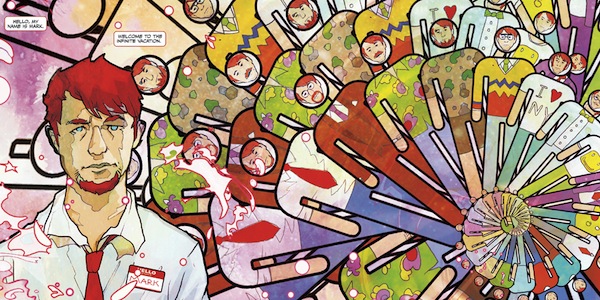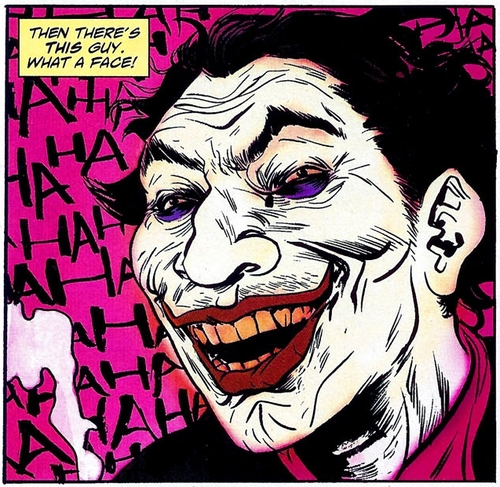This one's a bit high-concept. The Infinite Vacation requires a bit of familiarity with quantum physics (the firing-particles-at-a-sheet-of-metal kind, not the nonsense-hand-wavy kind). The relevant bits of quantum physics in brief: some particles exist as a wave of probability - it’s not until they're observed that they have a fixed position. Therefore, they exist at all possible points at once until they are observed, at which time the probability waveform collapses to a single point. In Many Worlds Theory, this sort of probability waveform is thought to apply to the whole universe, but the waveform never collapses, so every possibility spirals out as its own parallel universe.
The relevant bits of quantum physics in brief: some particles exist as a wave of probability - it’s not until they're observed that they have a fixed position. Therefore, they exist at all possible points at once until they are observed, at which time the probability waveform collapses to a single point. In Many Worlds Theory, this sort of probability waveform is thought to apply to the whole universe, but the waveform never collapses, so every possibility spirals out as its own parallel universe.
The Infinite Vacation is a marketplace app allows you to purchase another version of your life and switch places with the version of you living it - to switch one point on the probability waveform for another. The world that this creates is incredibly well-realised. The world has adapted to the technology as we do with any impressive burst forward - a initial flurry of excitement that rapidly gives way to accepting it as absolutely normal. There are small, luddite-like groups of organised abstainers, but that's about it.
Mark is a serial vacationer, jumping from life to life in pursuit of the life he wants (something he can’t identify), but always winding up repeating the same patterns, grinding himself down in a dead-end job, and moving on again when he can't take it any more. When it seems that someone is trying to eliminate versions of him from across all possible universes, he groups together with some other versions of himself to figure out what's going on.
I don’t necessarily like the art style in this book so much as appreciate it. What seems scrappy to begin with has the complexity and the brio to take a remarkably complex narrative and make it comprehensible. There are simple tricks like colour-coding for specific characters that help them stand out from the the sometimes highly abstract backgrounds, strong character designs to help distinguish an infinite number of Marks.
A word of warning: there are some genuinely unpleasant scenes - needless to say, with infinite variations of each person, some of those are not very nice. These seem to be played for stakes rather than as Mark Millar-esque shock, but that doesn’t prevent them from being deeply nasty to the unprepared.
It's not that this is the first time many-worlds theory has been tied to a story in this way, but the execution of The Infinite Vacation is superb. Major story themes are directly mapped to elements of quantum theory in a way that is comprehensible without being trite, forced, or overexplained. In the last big action beat of the book the way the art, writing, and the overarching blend of the story and physics come together in a genuinely virtuoso sequence. I have a genuine love for anything that marries theme and plot this tightly - it's one of the reasons I love Alison Bechdel's books. If you have a similar love for that sort of arch-structuralist work, or just something that will make you swear under your breath at the authors' cleverness, The Infinite Vacation is highly recommended.







